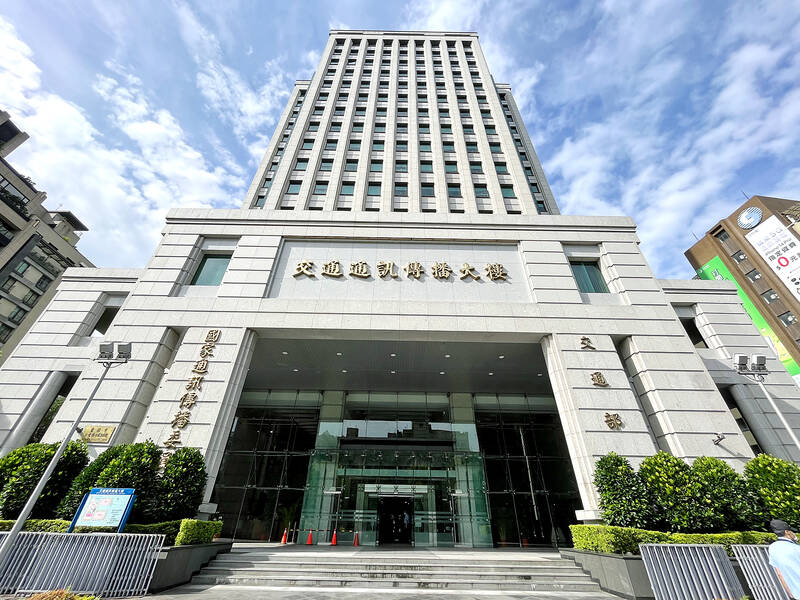The National Communications Commission (NCC) yesterday said it would discuss with telecoms ways to waive a NT$300 fee to have embedded SIM (eSIM) cards installed on mobile phones.
Unlike traditional SIM cards, which must be manually inserted into SIM slots on phones, an eSIM card can be installed by scanning a QR code provided by a telecom.
When changing to a new mobile phone, users can use “over the air” wireless technology to reinstall their eSIM on the new phone.

Photo: Chen Hsin-yu, Taipei Times
Apart from saving users the hassle of changing SIM cards, an eSIM also makes it possible for users to have dual SIM cards installed on a smartphone, allowing work and personal calls on the same device.
However, eSIMs can only be installed on newer smartphone models that support the feature, and users are charged a NT$300 fee when they purchase a new phone or switch to a different telecom.
Although there is no production cost for eSIM cards, the information security and verification technologies required for remote transmission are quite complex, the commission said.
“As such, so far only platforms verified by the Global System for Mobile Communications Association can issue eSIM cards, which would regularly charge telecoms maintenance fees, eSIM installation fees and fees for securing electronic serial numbers,” it said.
Such costs cannot be unilaterally decided by telecoms, the commission said.
“We will work with the telecoms to see if there is room for fee reduction,” NCC Vice Chairman and spokesperson Wong Po-tsung (翁柏宗) said.
Currently, telecoms waive eSIM installation fees if subscribers install them for the first time. They also waive the fees for “VIP” customers and people who have recently renewed their service contracts or need to change to a new eSIM every five years.

Nipah virus infection is to be officially listed as a category 5 notifiable infectious disease in Taiwan in March, while clinical treatment guidelines are being formulated, the Centers for Disease Control (CDC) said yesterday. With Nipah infections being reported in other countries and considering its relatively high fatality rate, the centers on Jan. 16 announced that it would be listed as a notifiable infectious disease to bolster the nation’s systematic early warning system and increase public awareness, the CDC said. Bangladesh reported four fatal cases last year in separate districts, with three linked to raw date palm sap consumption, CDC Epidemic Intelligence

Two Taiwanese prosecutors were questioned by Chinese security personnel at their hotel during a trip to China’s Henan Province this month, the Mainland Affairs Council (MAC) said yesterday. The officers had personal information on the prosecutors, including “when they were assigned to their posts, their work locations and job titles,” MAC Deputy Minister and spokesman Liang Wen-chieh (梁文傑) said. On top of asking about their agencies and positions, the officers also questioned the prosecutors about the Cross-Strait Joint Crime-Fighting and Judicial Mutual Assistance Agreement, a pact that serves as the framework for Taiwan-China cooperation on combating crime and providing judicial assistance, Liang

The manufacture of the remaining 28 M1A2T Abrams tanks Taiwan purchased from the US has recently been completed, and they are expected to be delivered within the next one to two months, a source said yesterday. The Ministry of National Defense is arranging cargo ships to transport the tanks to Taiwan as soon as possible, said the source, who is familiar with the matter. The estimated arrival time ranges from late this month to early next month, the source said. The 28 Abrams tanks make up the third and final batch of a total of 108 tanks, valued at about NT$40.5 billion

Reports of Taiwanese going missing, being detained or interrogated, or having their personal liberties restricted in China increased about fourfold annually last year, the Mainland Affairs Council (MAC) said yesterday. Last year, 221 Taiwanese who traveled to China were reported missing, were detained and interrogated, or otherwise had their personal freedom restricted, up from 55 the previous year, the council said. Reopening group tours to China would be risky, as it would leave travelers with no way to seek help through official channels after Beijing shut down dialogue between the associations tasked with handling cross-strait tourism, the MAC said. Taipei’s Taiwan Strait Tourism